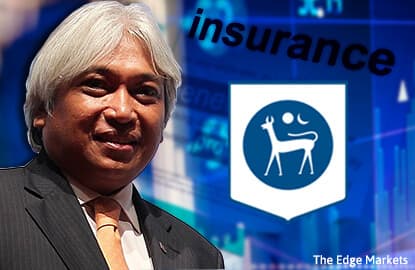
KUALA LUMPUR (Oct 18): Malaysia's insurance industry has in essence, not delivered the required results expected of it, said Bank Negara Malaysia (BNM) Governor Datuk Muhammad Ibrahim.
In his keynote address at the Sixth Malaysian Insurance Summit today, the governor said the central bank had in the Insurance Annual Report for 2000, projected Malaysia’s insurance sector would expand, following the trajectory of an “S-curve”.
BNM had forecast then that growth in both the life and general insurance markets would significantly outpace the economy, ascending the steep slope up the S-curve.
Ibrahim said since then, total assets of the insurance and takaful sector have expanded at an annual rate of 13.3%, more than tripling in value from RM52 billion in 2000 to RM181 billion in 2010, with life insurance penetration increasing from 33% to 51% of the country's population over the same period.
However, he noted in recent years, growth within the insurance industry has started to plateau, with life insurance penetration remaining stagnant at 55% over the past three years .
Also, the general insurance sector has seen domestic capacity for larger and more specialised risks, appearing to reach its limits.
“This in turn has contributed towards sustained reinsurance outflows which have an impact on the country’s long term current account balances.
“Based on our observations, the industry appears to be approaching the point of inflection in the S-curve,” said Ibrahim.
Nevertheless, Ibrahim said the growth potential for the insurance industry remains significant, with Malaysia still long way from being a saturated market.
The governor, who said he has a connection to the insurance industry as he is the first BNM governor with an insurance background, said the industry is ripe for transformation to a new growth trajectory.
“This calls for transformational change, [is] driven and reinforced by positive drivers that will revitalise the industry.
“In the context of financial services today, these drivers focus on three 'T's — talent, technology and trust,” said Ibrahim.
Speaking briefly about the three Ts, the governor said the insurance industry needs to make further efforts to attract and nurture new talents.
“For example, the lack of underwriting expertise is a major reason why we have yet to stem the outflow of insurance for large and specialised risks.
“Over the last five years, the amount of direct and reinsurance premiums ceded overseas for the marine, aviation, transit and energy risks, amounted to over RM5 billion, with the retention ratio for these classes remaining below 30% for the last 10 years.
“With our world-class oil and gas industry and one of the largest airline fleets in the region, having the requisite insurance underwriting expertise in these sectors is not only a logical business extension for the industry; it is also an important economic imperative for the country,” he said.
As for technology, he said insurers need to stay ahead of the curve in leveraging new technologies to be more accessible, more efficient and more agile.
“The insurance industry needs to accelerate its pace in terms of its technological adoption, or else events will dictate the shape of the industry’s future,” he said.
For the trust aspect, Ibrahim said there is no question that the potential for growth in the insurance and takaful industry is significant, with estimates placing the life and medical insurance protection gap alone in Malaysia at between RM550,000 and RM723,000 per household.
“Closing this protection gap is ultimately the moral responsibility of the industry.
“Microinsurance and microtakaful should be further developed to improve access to the underserved segment of society,” he said.
He added that the insurance industry also needs to explore new cost-efficient delivery channels, as the industry has not done well in this respect.
“As a catalyst, beginning next year, insurers will be required to offer pure protection products, through a direct channel, without commissions.
“The high internet and mobile phone penetration in Malaysia suggests that internet or mobile insurance makes good sense,” he said. Other untapped channels include banking agents, retail chains, employers and cooperatives.